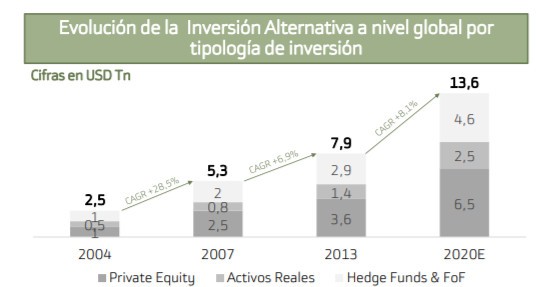The global investment landscape is constantly evolving, and one area that has been gaining significant attention in recent years is alternative investments. A recent research study conducted by HTF MI titled Global Alternative Investments Market sheds light on the current state of this market, highlighting key players and trends shaping its growth. Thus, alternative investments hold great potential for investors seeking diversification and attractive risk-adjusted returns.
In the face of recent economic recessions and market volatility, this type of investment seems to be continuously gaining traction. Up until 2021, alternative investments were experiencing accelerated growth, and although they slowed down during the Covid-19 pandemic, the market remained active.

The recent III Jornada de Inversión Alternativa held by the global network of professional service firms offering audit, legal, and tax advisory services, KPMG, highlights that these types of private assets have become a formula for portfolio diversification, as well as a way to manage financial uncertainty for companies.
The rise of venture capital
During the conference, Francisco Uría, Banking & Capital Markets Global Head and Partner in charge of the financial sector at KPMG in Spain, pointed out that alternative investments have attracted attention due to high market volatility, which drives investors towards greater diversification, the search for returns that avoid the fluctuations of each economic cycle, and the gradual entry of institutional investors that has generated greater confidence.
In this regard, one particularly notable fact is the growing popularity of venture capital as an alternative investment option. The aftermath of the recession led many public companies to go private, allowing them to restructure and rebuild before going public again. This trend has created significant opportunities for investors and contributed to the rise of new companies worldwide.
Venture capital investments offer access to promising early-stage companies and the potential for significant profits. As more investors realize the advantages of venture capital, it is expected that the market will continue to grow and innovate.
You may also be interested in reading: What is the situation of small venture capital firms in a more conservative market?
Regarding Latin America, according to an article published by Bloomberg Línea, venture capital stands out as the predominant option among technology companies. The region is known for its high digital potential, with Colombia alone expected to generate $114 billion by 2030.
Although private equity activity – private equity, private debt, and venture capital – in Spanish-speaking countries in the Americas experienced a clear decline compared to the record reached in 2021, with a contraction of 15%, the $41.8 billion recorded in 2022 represents a level significantly higher than that of the past decade, more than doubling the amount achieved in 2019, as highlighted by Fynsa.
Integration of ESG and Real Assets Investment
Another interesting aspect is the impact of integrating environmental, social, and governance (ESG) factors in real assets investment. With increasing awareness of sustainability and responsible investment, the integration of ESG factors in investment decisions has gained importance. This trend presents significant opportunities for alternative investments in real assets, such as infrastructure projects and renewable energy. By aligning investments with ESG principles, investors can not only generate financial returns but also contribute to positive environmental and social outcomes.
https://www.youtube.com/watch?v=PSVpth7uqb4
Challenges for the future
While alternative investments offer promising opportunities, it is important to recognize the challenges associated with this asset class. The HTF MI research study mentions complexity and higher fees as common obstacles in alternative investments. Due diligence and a deep understanding of investment strategies are crucial to effectively address these challenges. Investors must carefully assess risk and return profiles and consider factors such as liquidity, market conditions, and regulatory requirements before committing to alternative investments.
You may also be interested in reading: Brazil maintains its leading position in agrifoodtech investment in Latin America
The benefits of diversification, attractive risk-adjusted returns, and the rise of private capital indicate a shift in the investment landscape. Additionally, the integration of ESG principles in real assets investment presents new opportunities for investors to align their portfolios with sustainable practices. However, it is essential.








